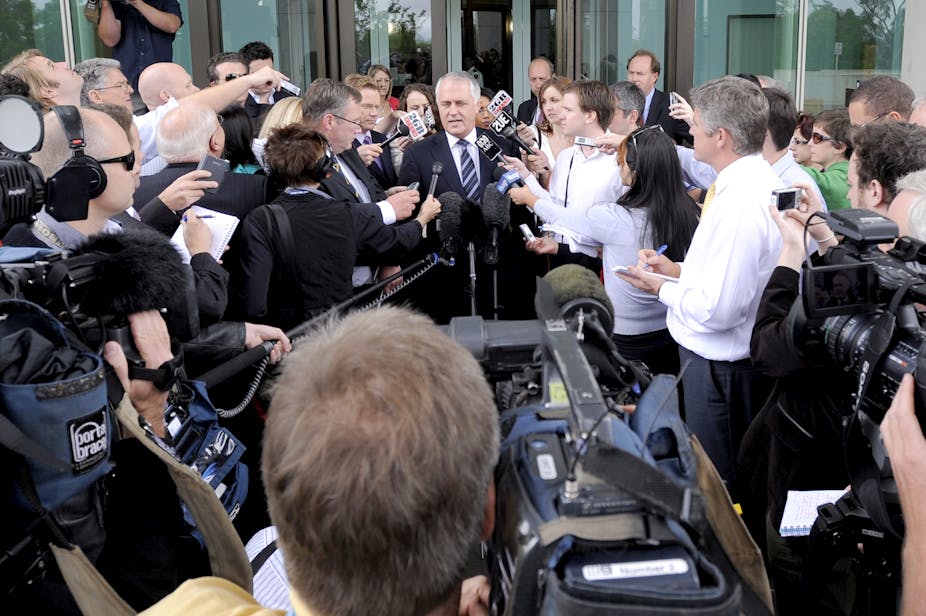The media has wasted little time reminding the Coalition government that its rigorous scrutiny of the former Labor government was par for the course. Journalists are snapping at the Coalition’s heels on government debt, asylum seeker arrivals, and expenses claims.
Already it’s being said that although voters always end up disillusioned with governments, in the present case it - according to one commentator - “appears to be coming quicker than usual”. While trenchant coverage by some media outlets fanned the agitation for the (ultimately unsuccessful) stricter media regulation proposed by the former Labor government in March this year, it has so far not assumed the “hate media” proportions that led to Labor’s Finkelstein exercise.
The Coalition largely benefited from the strident anti-Labor posture some media outlets took during the recent election campaign. Does this absolve the Coalition government of media regulation designs? While in opposition, Malcolm Turnbull forcefully and eloquently led the Coalition’s charge against the media reform package of his predecessor, Stephen Conroy. Turnbull described it as:
…the most absurd farce this wretched government has dragged this parliament into.
Now, as federal communications minister, Turnbull has affirmed the government’s overall policy of cutting regulation and red tape. He has pledged to review the policy objectives of regulations.
Is that objective relevant any longer? If it is not, the regulation should go. If it is still relevant, can we achieve the objective more cost effectively?
On cross-media arrangements, Turnbull said that while the government had no plans to change the cross-media laws and while he was not ruling out any reviews, we “shouldn’t be anticipating any dramatic changes”.
What then might constitute dramatic change? The kind manifested in Conroy’s failed media reform package, widely seen as a full frontal assault on freedom of speech, would rate as dramatic.
The Coalition is not short on free speech proponents. Turnbull aside, prime minister Tony Abbott advocated protection for “things that are unsayable in polite company” shortly before the election. Also in opposition, the Coalition’s attorney-general George Brandis stoutly defended freedom of speech, warning against:
….a comprehensive challenge – arising from a modern-day puritanism, driven by an ideologue’s intolerance of alternative or dissenting views.
While reflecting the sentiments of Abbott and some of his new ministers as captured above, the Coalition’s “Real Solutions” manifesto leaves the door open to supporting “an open and accountable media”, and to working with the media:
…to ensure they actively strengthen their standards so they meet community expectations of the levels of journalism Australians expect and deserve.
Any indelicate handling of such moves, however, runs the obvious risk. Even so, questions have surfaced. There have been calls, for example, to purge the ABC of its alleged anti-Abbott bias, and for a major review of the ABC’s operations and the ABC Act.
Turnbull has been at pains before and after the election to downplay cuts to the public broadcaster, noting in February 2013 that “we don’t have any plans to cut the funding to the ABC”. Since taking office he has acknowledged the ABC as a “vital part” in Australia’s democracy.
The ABC was allocated A$1 billion in the 2011 federal budget. Belt-tightening, even for the ABC, is not inconceivable given that the austerity theme entered the discourse even before the election. Will the ABC be quarantined from cuts, and if not, at what point will austerity-driven cuts morph into the kind that resembles the Howard era’s “campaign of vilification of public broadcasters”? It has been suggested that even a $50 million cut would be “a hammer blow” to the ABC.

Other media regulation areas are fertile for attention. These include regulatory reform sought by commercial broadcasters aimed at lowering or removing broadcast licence fees, which they argue is among the highest in the world and which they say constitute a relic of the pre-internet age. Turnbull recently said that he was “very focused on reducing the cost of doing business in my area”. On that basis, there could be movement in this regard.
Media commentator Mark Day argued that while:
…upsetting the media status quo will be low on Abbott’s priorities, there are a number of matters that must be attended to.
There is unfinished business arising from the recent media reviews. It is likely that the print sector’s ongoing review of best practice will continue without too much Coalition prompting. Deadlocked moves in the UK show how arduous and time-consuming this process can be.
The Convergence Review argued the case for a “new approach” to media regulation because many elements of the current regulatory regime are “outdated or unnecessary and other rules are becoming ineffective with the rapid changes in the communications landscape”. This process is likely to continue.
The Coalition promised attention to the Racial Discrimination Act to focus on “offences of incitement and causing fear but not a prohibition on causing offence”. Reform of privacy law to resolve privacy concerns has been looming for some time, and a new issues paper was recently released.
So, there is no shortage of grist for the media reform mill. And where the reform initiative encroaches on freedom of speech, resistance is likely to follow. Chances are that this time around, however, reform will be pursued in measured doses without resorting to ultimatums, as Stephen Conroy did.

